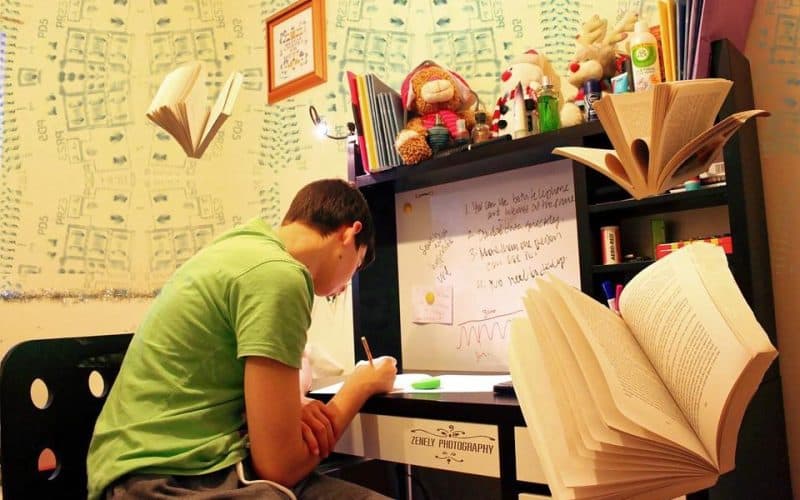A child not completing their class work isn’t just an academic concern. They learn to downplay, ignore, or accept falling short of their responsibilities. This behavior will contribute to their character, and if left unchecked will only get reinforced with age and repetition.
Consistent class work requires both stable work schedules and an established work area to thrive. Their poor performance can be overturned with proper support, but impulsive punishments will only distract them from the problem to be addressed.
Improvement will take time and training, so don’t punish them if they fall short at times. Make sure you understand the context behind their poor performance. Ask your child how you can help them do better, and if that’s not enough seek out inputs from others.
Your child not completing their class work is the issue, not them. Focus on improving their productivity and motivation here: You want your child to be more responsible for their sake – not just to avoid punishment from you.
Things You Can Do if Your Child is Not Completing Class Work
Create a Consistent Work Schedule
Class work is great because students get the freedom to handle it however and whenever they please, allowing them to tailor that schedule to their convenience. This freedom comes bundled with a lack of inherent structure, making it a lot easier to procrastinate those responsibilities.
Class work can feel like something negligible in life – to be done only during downtime or whenever you feel like it, if at all.
Some children may disregard their class work entirely, lowering their scores! Your child needs to develop the discipline to see their responsibilities through.
In this instance, you need to make accomplishing these requirements more integral to their life.
Start by figuring out when your child works best. A person’s peak productivity hours can vary greatly. Some are most capable in the morning, while other people do their best work in the afternoon. Keep in mind that YOUR best work hours won’t always be the same as your child’s.
While some people do thrive working past the evening, being a night owl can be taxing on your child’s sleep cycle. Be sure to set a firm curfew to ensure your child gets the rest they need.
Having a negotiable work schedule doesn’t mean that you can just drop in and out of productivity whenever you please: it means that you have the freedom to organize your preferred schedule. This is also a responsibility, so teach your child to view it that way.
If your child learns to take this freedom for granted, they might enable their own lack of initiative and productivity. This could prove problematic down the line.
A dedicated daily work window is a crucial ingredient for solid, sustainable productivity. Make sure that your child learns to set time aside to handle their workload, but let them decide on when they would prefer to do so.
Establish a Dedicated Study Zone (Not Their Rooms!)
A dedicated study zone will complement your child’s designated schedules greatly, furthering their capabilities in not only class work but future responsibilities!
Make sure that your child’s work area is equipped with all the tools they need – preferably in close, accessible proximity. Academic books, writing implements, scrap paper, and coloring materials are just a few examples of crucial starting implements a young student needs.
As your child grows, what they’ll need from their workspace will change. Be sure to add and replace components as needed to best accommodate your child’s responsibilities.
For this time, it would also be a great help to restrict their distractions. Limiting their internet access or even banning their phones in the study zone would be a welcome start. Distractions will eat away at your child’s focus, so try to remove as many of them as you can.
It might be a good idea to provide some snacks and refreshments while they work, or at the very least allow them to bring their own into that workspace. This minimizes their less productive downtime while also keeping their energy (and motivation!) topped off.
Regarding Room Choice
You want a room that experiences minimal disruptions, so avoid common areas and living space. Having people walk in while they’re handling things could throw your child off – especially if said people don’t know what’s happening and unintentionally interrupt your child.
You DON’T want to turn their room into a study room. That room is a place of rest, which makes it difficult to focus. Think of it like trying to work while lying down on your bed – while you can do this, you’ll be far from your best and much more vulnerable to distractions.
If your child isn’t doing their class work as is, the last thing you want to do is cross those wires in their mind. This can’t always be helped, though – especially with homes with fewer spare rooms.
In these cases, it may also be worth considering having their study space outside of your home. Why not have them try being productive in their school’s library? You could also take them to a quiet restaurant – have them study over a plate of breakfast!
The main takeaway here is that you don’t want your child studying in spots they rest at. It’ll end up hard to focus on their task at hand, which would put a damper on any attempted improvements.
Accompany and Support them Directly (But Avoid Enabling!)
While improving their work conditions and time management skills is important, the best place a parent can be is by their child’s side. Children learn best with ample support and encouragement.
Do you want your child to treat their class work as a priority?
You’ll need to show just how important this is through the example you set.
Make time to accompany them while they work. You don’t necessarily have to lead or even guide your child through the process – your presence, support, and encouragement will suffix.
Offer to help with anything they need to improve on, but don’t insist on it. Your job right now is to facilitate support for your child – help them accomplish their own brand of success. Help them according to what they need from you, but let them proceed with their own goals and initiative.
There is a limit to be mindful of here: help them, but not to the point of enabling negligence. They’ll get into the habit of you bailing them out of their poor decisions otherwise.
You need to keep balance in mind. If they want to genuinely succeed, help them however you can. If they’re just doing the bare minimum – or worse, ignoring the issue – let them experience the consequences of those actions. Your child needs to take their responsibilities seriously, after all.
Avoid Abrupt Punishment (Unless the Situation Warrants It)
It’s easy to assume your child is being lazy or difficult on purpose, and some parents default to kneejerk punishments over investigating how to address the underlying issue.
Please avoid this. Your child needs education and explanation far more than any punishment. The last thing you need right now is straining the relationship you two share.
Your child not doing their classwork might not be due to rebelliousness, but something else entirely. It could be academic struggles, emotional duress, or poor organizational skills responsible for these shortcomings. Blaming your child won’t accomplish a thing.
Understanding your child is important to improve them. Make sure you grasp the context of their situation before making judgments on how to proceed. Even if the distraction or privilege in question was responsible for their academic lapse, you still need to present the issue delicately.
Be firm, but keep an open mind. Bring up their academic lapses, but gently ask why they didn’t manage them in time. Avoid interrupting them as they explain their side – your priority is figuring out a solution, not deciding what penalty would be most appropriate for them.
For example, let’s say your child failed to do their homework given on Friday the prior week. They were watching television at the time they could have been doing their class work – should you take away their tv privileges as punishment?
Rather than get upset and punish them, why not ask your child why they prioritized television over their responsibilities? They need to understand when they make mistakes to avoid repeating them moving forward. Punishments by themselves are never educational.
Give your child the freedom to figure out how to take responsibility for their mistake – people tend to be more motivated to follow through on their own suggestions. Your children deserve the opportunity to do better.
It’s not a bad idea to let them know what consequences come with certain actions, however. Be upfront with those terms, and enforce them only if your child agrees to those terms.
For instance, you could ask your child if it would be fair to take away their tv privileges for a day if they fail to do their classwork the following week. Make sure the arrangement and consequences are well-established to make sure everyone is on the same page about that topic.
Lack of Trying (and/or Disrespect)
Not every instance of this problem is due to your child struggling with circumstances. Some might be skipping their class work out of laziness, spite against the teacher, or deliberate ignorance.
In these cases, your child won’t even be willing to put in the bare-minimum effort to improve. It may be worth establishing consequences for their behavior, should it persist.
It’s okay for a child not to immediately thrive, so long as they try to better themselves. If they refuse to even take that first step, you can’t enable that mindset – it’ll only get worse as they grow.
This method is a last resort. Using this will strain your working relationship, so look into exercising this option only if your child is completely unwilling to take their efforts to improve seriously.
Look Into Underlying Causes
If your child has been doing okay before this point, there’s something behind their behavior – they didn’t just wake up and decide to be irresponsible. Identifying the trigger for their current behavior will be a huge step forward in solving it.
Alternatively, this might be your child’s first time dealing with this type of freedom. Fortunately, the above lessons to improve their class work experience would still apply.
Talk to your child about this – even a cursory check-up on their wellbeing will be plenty. Most kids will be upfront about what’s bugging them at the moment, so don’t be afraid to ask. Let them speak without interruption unless you’re offering comfort or support.
Once your child finishes, ask them what you could to do help them through this issue. Your child is likely to provide something that the two of you can work on together. Even if your child isn’t ready to share, the important thing is they know that you cared enough to ask.
Some issues can be a little tough to discern – especially if your child is the reserved sort. Not all kids will be upfront about everything to their parents, and this only gets worse with sensitive issues.
It’s important to respect your child’s boundaries, but if this situation starts to seem untenable your child’s well-being takes precedence. It might be wise to seek out another opinion here.
Get in Touch With Their Teachers
Next to you and your partner, your kid’s current teacher is likely the person most exposed to their academic struggles. If anyone would know about your kid’s academic issues, it’ll be them.
Your mileage may vary here, as an individual teacher’s role will vary across education levels. This solution works best when your child is in primary school – especially if the teacher in question is also in charge of their homeroom.
Get in touch with their homeroom teacher – send them an email inquiring about your child’s performance. They’ll likely give you enough feedback for your to improve your approach.
Other grade levels may have multiple teachers handling things, and they’d be less capable of providing you a clear picture of your kid’s academic performance. You can still piece together a general profile of how your kid’s holding up – it’ll just take a bit more effort.
When scheduling a consultation with their teacher, be sure to focus on your child’s performance as much as their academic marks. Have they noticed any concerning behavior from your child? Have they started acting strange or off recently?
No matter how much you love and care for your child, you will never encounter every facet of them. A second opinion is an invaluable asset, giving you a broader picture of how to proceed. You want to take care of your child properly – not just the side of them you encounter at home!
Final Thoughts
A child not doing class work can be explained by a few reasons – none of which can excuse the behavior. This habit needs to be mitigated, as this complacency could be character-forming. As a parent, you need to support your child until they can handle this responsibility on their own.









